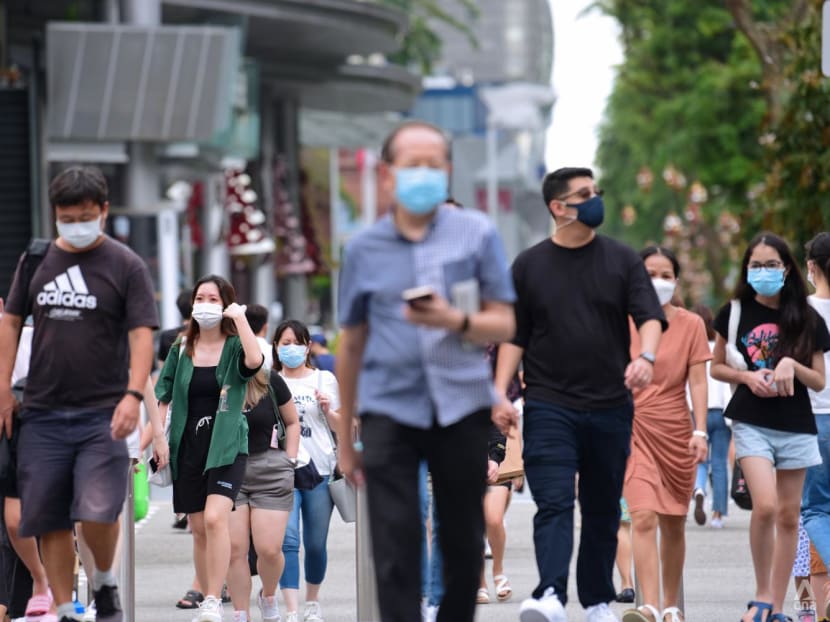Do cloth masks protect against the Omicron variant?

People wearing masks along Orchard Road in Singapore on Jan 5, 2022. (Photo: CNA/Gaya Chandramohan)
SINGAPORE: Cloth masks remain effective in protecting people from COVID-19, including the Omicron variant, as long as they are the right fit and material, said experts.
The type of cloth used in reusable masks makes a difference, said Associate Professor Natasha Howard from the National University of Singapore (NUS) Saw Swee Hock School of Public Health.
The masks should also have at least two layers, a nose wire or grip and be well-fitted, she added.
CNA spoke to experts about the level of protection provided by cloth masks, after the United States Centers for Disease Control and Prevention last week updated its mask guidelines.
N95 masks offer the best protection while “loosely woven cloth coverings” offer the least protection, the updated guidance said, while stressing the importance of a good fit.
N95 masks, typically worn by medical professionals, filter out respiratory droplets and smaller aerosol particles when worn properly. KN95 masks, the Chinese version of the N95 masks, do the same.
“While N95/KN95 disposable masks are more effective than cloth, given the current situation in Singapore with high vaccination and strong health system, the added cost may not provide much value for most Singaporeans,” said Prof Howard.
Good cloth masks remain “very effective” as long as they are worn properly and associated with safe distancing and hand hygiene, said Professor Dale Fisher, senior consultant at the National University Hospital Division of Infectious Diseases.
“Most important is that they are triple-layered with an inner layer of absorbent material, such as cotton, a middle layer of non-woven filter such as polypropylene an outer non-absorbent material such as polyester,” said Prof Fisher, who is also Professor of Medicine at NUS Yong Loo Lin School of Medicine.
He added that they should be comfortable and fit well over the mouth and nose. While the mode of transmission of the virus has not changed, the more transmissible Omicron variant is “less forgiving” of any breaches in infection control, he said.
PROTECTION FROM CLOTH MASKS
Professor Lam Yeng Ming, chair of School of Materials Science & Engineering at the Nanyang Technological University, said cloth masks give “some level” of protection against Omicron.
“The more layers of fabric they have, the more protection they can provide. They also need to be properly worn to ensure good adherence to the face,” he said.
However, given that Omicron is “far more transmissible”, high-filtration masks, such as N95s or KN95s, may be needed.
The experts urged people to only buy cloth masks that are of good quality and have two to three layers, and not to wear masks with exhalation valves. Prof Lam also suggested that people look for masks with PFE (Particle Filtration Efficiency) and BFE (Bacterial Filtration Efficiency) certification whenever possible.
One such mask is the new reusable mask distributed by Temasek Foundation. The antimicrobial mask has an N95 filtration middle layer with a PFE of more than 95 per cent, and is effective at that PFE for up to 30 weeks when rinsed weekly, a spokesperson said.
"It is also more breathable than standard N95 filters, and remains breathable even after repeated rinsing," the spokesperson added.
In a guide on face masks on its website, the Health Sciences Authority said that in general, the material should not be see-through when held against light.
The HSA also said that people who use reusable masks should follow the manufacturer’s instructions on washing, and replace them once they are used beyond the recommended number of times.
WHAT HAPPENS AFTER OMICRON?
One academic said that there may be scope in due course to relook the need for the universal wearing of masks.
Associate Professor Alex Cook, vice dean of research at the NUS Saw Swee Hock School of Public Health, said that after the Omicron wave has abated, the lifting of the mask mandate should be "seriously considered".
The overall effect of wearing a mask has been estimated to be “fairly modest”, he said.
At the earlier stages of the pandemic, even a modest effect was worth it as the authorities wanted to do everything possible to prevent the spread long enough to roll out vaccinations, he said.
He noted that things are different now, given "very high" vaccination rates and growing booster rates at this stage of the pandemic.
BOOKMARK THIS: Our comprehensive coverage of the COVID-19 pandemic and its developments
Download our app or subscribe to our Telegram channel for the latest updates on the coronavirus pandemic: https://cna.asia/telegram










